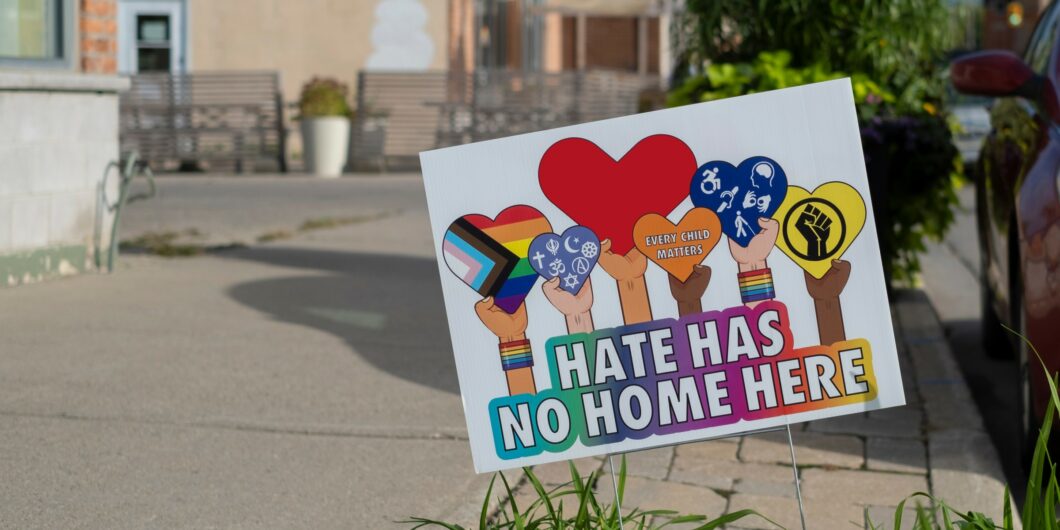One can be “woke” or one can be self-aware, that is, aware of man’s political nature. One cannot be both, and this puts SJW's beyond satire.
Searching for Character in Identity
A few years ago, I was teaching at an inner-city charter school, majority black, minority Hispanic. One Friday, over lunch at an all-day faculty diversity, equity, and inclusion (DEI) training, teachers were given sheets with concentric circles and asked to fill them in with words about our identities, with identities more important to us closer to the center. I penciled in baseball and basketball player, traveler, teacher, musician, philosopher, explorer, writer, friend. During the sharing time that followed, a middle-aged math teacher next to me shared that he wrote “son” and “brother” in the center circle. He said he had a very close relationship with his Italian family, and that he had recently gone through many difficult months of helping his brother through cancer and chemotherapy, which had made them even closer.
To wrap up this identity exercise, the 20-something workshop leader surprised the hall of over a hundred dining educators from three campuses. Standing in front, and apropos of nothing, she suddenly shouted at the top of her lungs “I am a black queer woman!” All the teachers at my table looked as puzzled as I was. At the table behind me, my 28-year-old history department head then stood up from his chicken cutlet and yelled “I am a white cisgender male!” No one seemed sure how to respond. There was silence. Then everyone went back to their mashed potatoes.
What went unmentioned in the larger discussion were the identities most teachers had written: commitments, relationships, character traits, hobbies, and experiences. The implicit message was that what really mattered—what was worth shouting—was one’s race and gender.
Rewind to 1985. I was 12. Troy, Carlos, and Juan were three black Dominican brothers four houses down. I was white. We played in the street all the time. Race never came up. My baseball coach and his two sons on the team were also black. All the other players were white. Coach had played in the minors and made everything look easy. After we won the league, he and I gave each other a bear hug. Race never came up, on the field or at home.
Back to the Future was the number-one movie in 1985. “We are the World” was the number-one song. The latter was written by Michael Jackson and Lionel Richie and produced by Quincy Jones. All three were black, but that was never the story. It was just a great song.
What changed since 1985? How did the America that taught students not to stereotype others based on race or gender go back to the future, obsessing on “the color of their skin” while ignoring “the content of their character,” the opposite of Martin Luther King, Jr.’s dream?
A big part of the answer is a dynamic identified by Alexis de Tocqueville in Democracy in America: As a society moves closer to social equality, citizens become more aware of and more uncomfortable with the inequalities that remain. Wrote Tocqueville:
When inequality is the general law of society, the most blatant inequalities do not strike the eye; when everything is nearly on the same level, the slightest variations are marked enough to hurt it. Hence the desire for equality always becomes more insatiable in proportion as equality extends to all. … Men will never establish any equality with which they can be contented.
Tocqueville here observes that more equal conditions put the spotlight on inequalities and make them more glaring, which, ironically, makes citizens more unsatisfied with the equality they have achieved.
And the reverse is also true: The more unequal a society is, the less citizens dwell on inequalities. The vantage point from which contrasting socioeconomic groups view each other is more distant, so their perceptions of each other are blurrier.
I observe this often in Panama, where I have lived for the last three years. Panama is officially a democracy but, like most of Latin America, it is an oligarchic society. It is the fourth most economically unequal country in the Americas, as measured by its GINI coefficient. Panama’s rich and poor are so far apart economically, in such different worlds of opportunity, that they do not spend much time mulling over the multiplicity of ways that they are unequal. Someone driving a Toyota Yaris does not spend time comparing every aspect of it with a Mercedes or a BMW, because those other cars are in a different orbit. There may be class tension, and the poor may resent the rich, but they are not comparing their stations in life point by point.
By contrast, American democracy levels the playing field and allows the whole society to play. But this leads to a new problem: It clogs up the field with competitors. Now, unlike aristocracies, citizens eye their differences more closely, says Tocqueville:
When all the privileges of birth and wealth are destroyed, when all the professions are accessible to all, and a man can climb to the top of any of them by his own merits, men’s ambitions think they see before them a great and open career and readily imagine they are summoned to no common destiny. This, however, is a mistaken view which experience corrects daily. … They have abolished the troublesome privileges of a few men only to meet the competition of all. The barrier has changed shape rather than place. Once men are more or less equal and pursue the same path, it is very hard for any one of them to move forward quickly in order to carve his way through the uniform crowd milling around him. This permanent struggle between the instincts inspired by equality and the means it supplies to satisfy them wearies and harasses men’s minds.
Rather than unleashing citizens’ energies, wokism shuts down the pursuit of earning distinction by awarding distinction for unearned traits.
Here, Tocqueville observes how the equality of democratic societies can both inspire and discourage. The open playing field that democracy creates inspires citizens to think they can shoot for the stars. But the “universal competition” democracy opens forms a barrier to advancement, creating a “permanent struggle” which can dishearten citizens. Equality encourages citizens to dream big, but standing in the way of one’s dream is the dream of everybody else.
But lest one think Tocqueville was not a fan of American democracy, he also expounded the benefits of a level playing field, universal competition, and permanent struggle: They unleash the energies of all citizens, he said, creating a dynamism and industry that no aristocratic society can match. This, believed Tocqueville, is the source of America’s greatness:
Democracy does not give its nation the most skillful administration but it ensures what the most skillful administration is often too powerless to create, namely to spread through the whole social community a restless activity, an overabundant force, an energy which never exists without it and which, however unfavorable the circumstances, can perform wonders. Therein lie its real advantages.
Citizens of democracies are therefore torn by the simultaneous pursuit of both equality and inequality. On one hand, they are unrelenting in their pursuit of social equality, which removes the barriers of class and thus unlocks energy propelling “restless activity” across society. But on the other hand, universal competition drives citizens to struggle to pursue social distinction, to stand out from the pack, to be unequal. And the more equal a society becomes, the more energy citizens must put into standing out.
Amid the universal competition of democracy, wokeism is a misguided attempt to achieve these simultaneous twin aims of social equality and social distinction. On one hand, wokeism’s solution to the difficulty of distinguishing oneself amid universal competition is not to help citizens better contribute to society and thus gain recognition, but to change the criteria for honors from social contributions to unearned group markers, like certain “oppressed” races and genders. Put differently, wokeism co-opts the trophies and medals that mark distinction in a competitive society, but it awards them without regard for the criteria that ensured that competition is useful and productive for society. Thus, wokeism leaves society incompetent and uncompetitive and renders its trophies meaningless.
Second, wokeism contradicts itself in pursuing social equality by treating part of society unequally, excluding so-called “oppressor” groups, for example “the patriarchy.” As Joshua Mitchell points out in American Awakening: Identity Politics and Other Afflictions of Our Time, this is simply an updated form of the ancient pagan practice of scapegoating, which resurfaces in new forms time and again in history. Scapegoating white heterosexual males today does as much to help oppressed groups gain literacy, job skills, and stable family lives as Stalin’s dekulakization purges helped poor Russians eat and Mao’s purges of traditional Chinese culture in the Cultural Revolution helped advance Chinese culture. Like a marriage counselor who advises that one spouse eliminate all influence of the other to achieve a better marriage, wokeism asks us to believe that purging the influence of part of society through zero-sum identitarian warfare is a path to equality and social justice.
In short, wokeism undermines and wastes what Tocqueville believed is America’s greatest strength. Rather than unleashing citizens’ energies, it shuts down the pursuit of earning distinction by awarding distinction for unearned traits. It calls this the path to equality; and, indeed, it is a path to a society in which all are equally incompetent and unproductive.
In a prescient passage, Tocqueville foresaw how democratic societies’ pursuit of social equality would lead to wokeism’s fixation on oppression: “However democratic the state of society and the nation’s political institutions, you can guarantee that each citizen will always spot several oppressive points near to him and you may anticipate that he will direct his gaze doggedly in that direction.”
The democratic mind conditioned to pursue equality relentlessly will always fixate on some oppression standing in the way, says Tocqueville. Wokeism is a manifestation of precisely this fixation. It started as a call to be “radically aware … of the rot pervading the power structures,” as David Brooks describes it, a rot that blocks the attainment of equality. But it has been taken to the extreme and turned into a massive overcorrection of inequalities, a wild goose chase in pursuit of equality ad absurdum, as I described in a recent article. It equates every inequality of power with oppression—even inequalities that are natural, necessary, and/or beneficial. Wokeism will never run out of inequalities to scapegoat, because as Tocqueville observed, the more equal a society becomes, the more inequalities its citizens will perceive.
Faced with the arduous challenge of universal competition which Tocqueville observed in democracies, wokeism offers an effortless way to stand out from the pack: It confers entitlement on those who possess certain unearned group markers of the oppressed and woke status on those who declare themselves “allies” of the oppressed. Being rich was the status marker of the 1980s; now wokeness is, for many, the new Ralph Lauren Polo or J. Crew Oxford, the status marker of the self-styled superior class. Hence what the two educators shouting “identities” at the DEI meeting were really broadcasting was their woke status.
I have not seen my old baseball coach since 1985. While writing this article, I found him online and reached out. He replied that at 83, he is still working, as the athletic director of a school in Florida. His photo on the school website shows the same strength and warm, contagious smile I remembered. Coach was born during segregation. No doubt he personally encountered racism and inequalities growing up. Through his ascent to the minor leagues in the desegregating America of the 1960s, he must have experienced acutely what Tocqueville observed: democracy’s permanent struggle amid universal competition and its ability to unleash the energies of all citizens by removing barriers to the playing field. The world needs more people like Coach, who stand out not for yelling their unearned race and gender, but for contributing their energies to change lives, like he changed mine.



